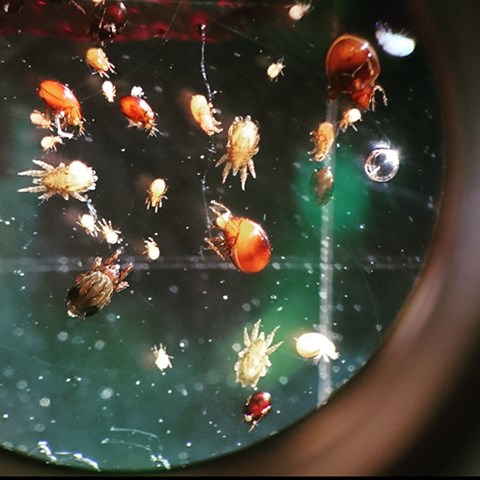Contact
Department of Soil and Environment, Soil nutrient cycling

In forests, wild boar rooting patches are clearly visible, but it is not as easy to see how they affect life in the soil. Now SLU can show that the wild boar reduces the number of soil mites, small animals that are important for nutrient availability, litter decomposition and soil carbon storage. To investigate this, the researchers mimicked the wild boar's search for food.
Wild boar is among the most widely distributed ungulate species and is present on almost all continents except Antarctica. In Scandinavia, wild boar population is expanding northwards in coniferous forests (boreal forests). Like humans, wild boars are omnivorous. They can feed on plant roots, bulbs, insects, earthworms and fungi during rooting activity. Rooting patches are signs of the presence of wild boar in an ecosystem and consist of disturbing the soil, pushing the plant and litter away to search for food.
Most of the previous research on the effects of wild boar on ecosystems have focused on their effects on plant communities while omitting the importance of soil decomposers. Soil decomposers drive important ecosystem functions such as plant nutrient availability, litter decomposition and soil carbon storage. In this study, we focused on the soil mite community, they are small organisms living in the litter and soil related to spiders. Soil mites are diverse, but we focused on two groups: the oribatid mites that are litter decomposers and the mesostigmatid mites that are predators and eat other soil decomposers.
“We used two approaches to study the effect of wild boar rooting on soil mite community and soil properties. Firstly, we sampled forest soil in rooted area and in adjacent area where the forest floor was intact. Secondly, we set up an experiment where we simulated wild boar rooting at different intensity and also with or without removing wild boar food resource”, says Nadia Maaroufi, researcher at SLU.
The aim of the experiment was to assess if it is possible to simulate wild boar rooting effects on soil organisms and properties, and to assess the importance of the soil disturbance compared to the removal of food resource on forest soils.
“We found that wild boar rooting decreased soil mite abundances, both decomposers and predators were impacted. We found that only the adult mite abundance declined in response to wild boar rooting, while juveniles were not impacted. This suggest that the decline of adult mite abundances may be transient and juvenile mites may be able to recolonize rooted patches in the long-term”, says Nadia Maaroufi, researcher at SLU.
They further found that rooting decreased soil moisture and soil organic matter content but can increase soil nutrients such as nitrogen compared to carbon. It shows that wild boar rooting may affect soil properties and soil mite communities in boreal forests.
Altogether, the results and previous studies on wild boar rooting suggest that the effects on soil properties and nutrient may not only depend on the temporality and intensity but also the volume of soil that has been rooted. The study also suggests that a combined use of natural and controlled experimental approaches is the way forward to reveal interactions between wild boar and soil organisms and the ecosystem functions they drive.
Northward range expansion of rooting ungulates decreases detritivore and predatory mite abundances in boreal forests, Royal Society Open Science, Nadia I. Maaroufi et al